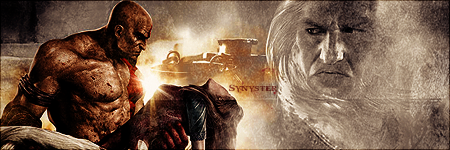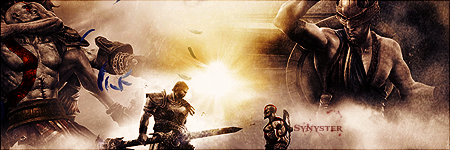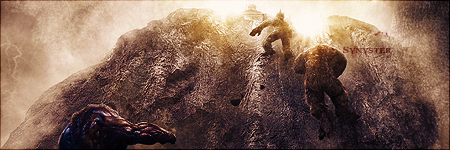This blog is going to be one MASSIVE SPOILER. So if you have not played God of War III, please do not read a single word of this... Actually, I haven't played God of War III either. D: Oh well. For those of you who don't feel like reading it, scroll down to the end and post an unnecessary comment if you must. :)
*SPOILERUS MAXIMUS*
Okay. So, having not played God of War III yet, thanks to my matters with university and other things I shall not discuss (It's not you, it's me), in order to quench my thirst for this game I have been spoiling many of its plot twists and whatnot. I have already watched the ending despite telling myself I will not stoop to that level so many times. I actually thought that the ending was good and that it was a nice way to conclude the series. This was, obviously, a very narrow (and somewhat obtuse) perspective. I had seen how Kratos dealt with the Gods and the very few Titans who had got in his way, and all that really phased me was that ripping the head of Helios from his shoulders or carving Cronos from the inside out was excruciatingly pretty. I did not really question his reasons for killing the Sun God, thus blackening the skies and causing it to rain constantly from there on out, or destroying Mother Earth by pushing the Blade of Olympus straight into her beating heart (therefore causing her to scream in agony and crumble to bits of dirt).
I didn't question any of this until I, out of curiosity and a bit of nostalgia, watched Ben "Yahtzee" Croshaw's Zero Punctuation video review of God of War III. After watching it, I began to question everything (well, most things) that happened in the series' third and final game in the main story (not that yarble that is Chains of Olympus and Ghost of Sparta). Yahtzee points out that both of the first God of War games really did have a reason for why Kratos chose to kill every person, animal, God, Titan, mythical beast, or even just a piece of fruit that got in his way.
Why did he kill in the first game? Because that butt-nugget, Ares, apparently deceived you and made you kill your wife and only child so that they would not interfere in Kratos' progress in becoming the loyal servant of Ares. Furthermore, there was that added hint of emotion to the game in Kratos being quite remorseful; thus allowing the player to sympathise with Kratos.
Why did he kill in the second game? Because that old bastard with a constantly exposed chest (and shiny nipples :|), Zeus, dethroned you of your divine status and made you a demigod once more. The game's story did not really focus on Kratos and his past this time around, as the first game served the back-story. Instead, the game introduced players to the (altered) story of the war between the Titans and the Gods. It was essentially intended to show what a prick Zeus could be. That, coupled with the fact that apparently Zeus stepped on your beloved city of Sparta, drives Kratos to kill the Sisters of Fate in order to step back in time to the moment that Zeus killed you at the start of the game and take him on in an awesome battle atop the Summit of Sacrifice (cool name, I know!). The games ends, on what I thought, was an awesome cliffhanger.
Why am I picking on the subject of God of War III's story and ending? Well, because David Jaffe, the series creator and director of the first God of War, stated that "God of War III explains, or ultimately will explain, why there are no more Greek myths." This statement has been bouncing around my head ever since God of War II was released and God of War III's existence was hinted at. The ending to God of War III, though, was (pretty much) kill Gaia along with Zeus (or so you think); Zeus comes back as a ghost and kills you, destroying all of your weapons in the process; Kratos goes into a cool little mindwarp section where he's running through his memories and thoughts (reminiscent of certain gameplay sections in inFamous); Kratos learns to forgive himself (cue HUGE revelation) and learns that Pandora's Box contained the one thing that mortals did not have, which is hope; Kratos awakens with this new-found hope and slaughters Zeus; cue final cutscene of the game where a huge element of the story is revealed, and Kratos sacrifices himself.
I don't feel like going into every single detail, but I'm just curious about something. The act of Kratos sacrificing himself was to release hope to every mortal on Earth, but what do they do with this hope? Kratos, in his quest for vengeance, had ultimately destroyed the world around himself. Why? Because of "daddy issues", as Yahtzee so well put it. Hope isn't going to help the mortal rebuild the friggin' world, stop the frakkin' rain and bring the old sunshine out again, and stop all the remaining land from flooding due to a rise in water levels thanks to the death of Poseidon. How is that an explanation as to why there are no more Greek myths? At least tell us what the hell happens to the rest of the world! The reason for why there are no more Greek myths cannot be "O, koz Kratoze killedz them!!1!" You can't just leave the world in chaos, even though it was hinted at several times in trailers. The whole fundamentals of Greek mythology would just be stupid and smell of poo. :(
I know that my argument is a bit hollow (I'm flattering myself), but you can blame it on my Economics quiz on Thursday and my Business Information Systems semester test (for which I still haven't studied!). What's the moral of this story, kids? Don't make ambitious statements when you know that weirdos like synyster-666 exist, and will write up random blogs arguing the validity of their favourite game series' storyline and conclusion! D:
*ENDUS NOWETH*
For those who skipped the massive spoiler, here's something I whipped up in the past two days.







I made a sig rotation series; mostly because I wanted to show you all that I still love God of War. :P
A note to all those who have read this blog... I HAVE NOT PROOF READ. :o So bite me.
But yeah... PEW-PEW-PEW! Seeya. D:




















Log in to comment